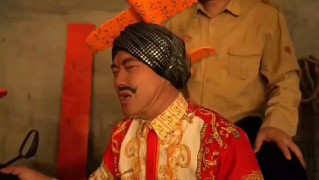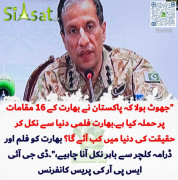C
commander
Guest

A desperate Musharraf may drag in the Army
http://www.thenews.com.pk/top_story_detail.asp?Id=23440
Friday, July 24, 2009
By Ansar Abbasi
ISLAMABAD: There exists a real possibility of a cornered General (retd) Pervez Musharraf attempting to drag the Pakistan Army into the current case in the Supreme Court to save his own skin, but he could end up doing even greater damage to himself.
A top lawyer, who remained closely associated with Musharraf and represented him in different cases in the past, confided to The News that Musharraf may take refuge under the institution of the Pakistan Army by arguing before the 14-member bench of the Supreme Court that the Nov 3rd 2007 emergency cum martial law was the consequence of his consultation with others including military top command.
The lawyer confided to The News on condition of anonymity that Musharraf would though finalise his strategy within a day or two as how to deal with the apex court notice issued to him, he would possibly drag Pakistan Army and its top command in Nov 3rd case to secure himself from being sent to gallows for his Constitutional misdoings.
Abdul Hafeez Peerzada is reportedly in London and already having consultation with the ousted dictator. According to the source, Musharraf is expected to inform the apex court that his decision of imposing PCO on 3rd Nov, 2007 was the conseqence of his consultation with the then Prime Minister,Governors, military high command including corps commanders, vice chief of army staff and presently Army Chief General Ashfaq Pervez Kayani and Chairman Joint Chiefs of Staff Committee General Tariq Majeed.
The source said that the ousted dictator would have the option of citing the content of the Nov 3rd PCO, in which the ousted dictator had claimed, the PCO was being promulgated after the situation has been reviewed in meetings with the Prime Minister, Governors of all four Provinces, and with Chairman Joint Chiefs of Staff Committee, Chiefs of the Armed Forces, Vice-Chief of Army Staff and Corps
Commanders of the Pakistan Army. It is, however, not yet clear if the meetings that he referred to in the PCO were officially documented (minutted) or he was advised by anyone in writing to take the Nov 3rd unconstitutional action. The PCO used the word reviewed, which does not mean anything as far as fixing the responsibility on others for Musharrafs unconstitutional action of Nov 3rd is concerned.
However, interestingly the superior judiciary in Judges Case, also known as Al-Jehad Case, had ruled that even in cases where consultation and advice as provided in the law and constitution are mandatory do not mean anything if they are not meaningful and are not given in writing. In view of the Supreme
Courts own interpretation of the words consultation and advice, the 14-member bench would decide how to deal with Musharrafs move if he tries to drag others including the incumbent Army Chief, the
Chairman Joint Chiefs of Staff Committee by referring to the wordings of the PCO. In such a case, however, Musharraf would be required to produce before the apex court the evidence where the former Prime Minister Shoukat Aziz, the then four Governors and militarys top command had advised him in a meaningful manner and in writing to do what he did on Nov 3, 2007.
It is doubted that Musharraf has got anything in writing from Shaukat Aziz, any of the Governors, the then VCOAS, Chairman Joint Chiefs of Staff Committee and the Corps Commanders, suggesting him to impose mini-martial law on Nov 3rd November 2007. It is generally believed that the Nov 3rd unconstitutional action, which was taken by Musharraf in his capacity as Chief of Army Staff, was simply meant to pre-empt a possible judgment from the then Supreme Court against his bid for a second term in the Presidency.




























